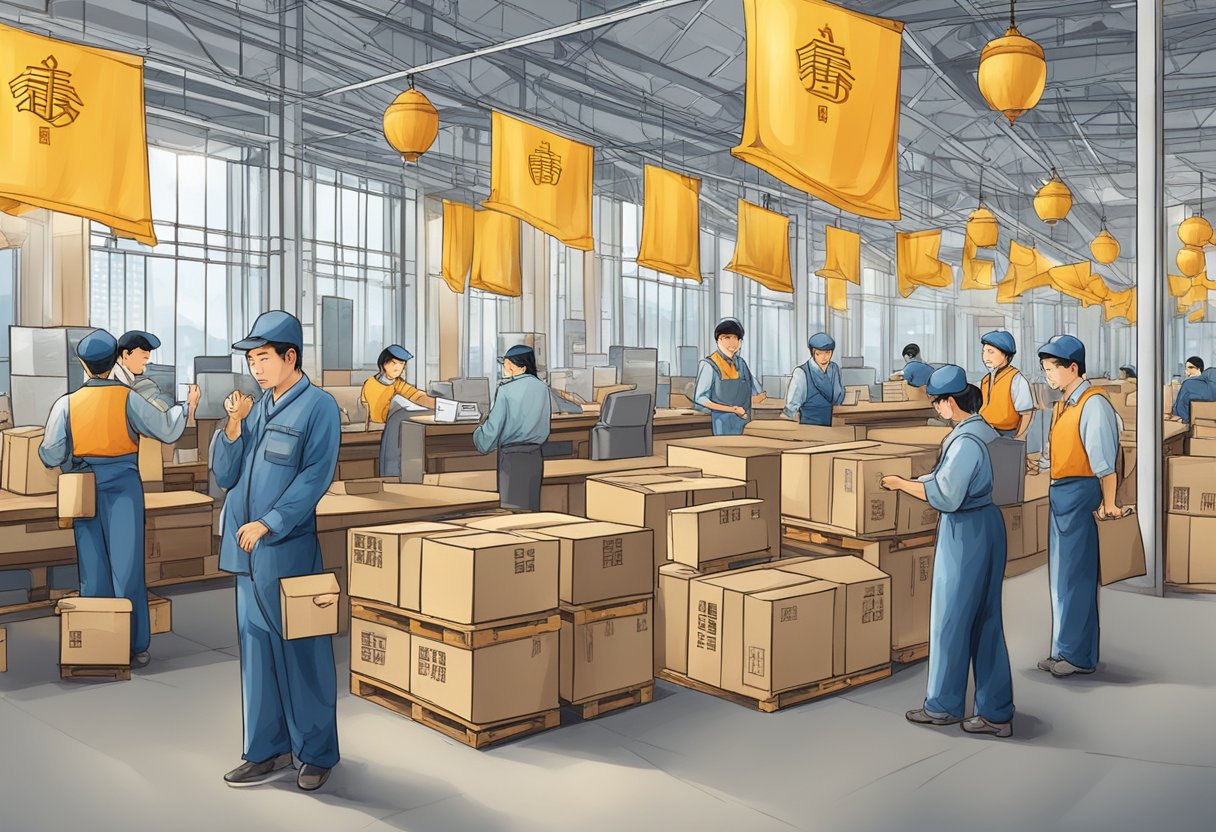A Chinese trading company is a business that imports and exports goods to and from China. These companies play a significant role in the global economy and are responsible for a large portion of China’s international trade. Chinese trading companies offer a wide range of products, from electronics and clothing to machinery and raw materials.
China is the world’s largest exporter of goods, and its trading companies are a driving force behind this. These companies have been able to take advantage of China’s low labor costs and large manufacturing base to produce goods at a lower cost than many other countries. As a result, Chinese trading companies are able to offer competitive prices to their customers around the world.
While Chinese trading companies offer many benefits, there are also risks associated with doing business with them. Some companies may engage in unethical practices, such as using child labor or violating environmental regulations. It is important for businesses to thoroughly research potential trading partners and ensure that they meet ethical standards. Despite these risks, many businesses continue to work with Chinese trading companies due to the advantages they offer.
The Landscape of Chinese Trading Companies
Chinese trading companies have been playing a crucial role in the country’s economy and international trade for many years. These companies are involved in a wide range of business activities, including import and export, distribution, and manufacturing. With the rapid growth of the Chinese market, many trading companies have expanded their operations and established themselves as key players in the global marketplace.
One of the key factors that have contributed to the success of Chinese trading companies is their ability to navigate the complex regulatory environment in China. To operate legally, trading companies must obtain a business license and register their capital with the government. This process can be challenging, particularly for foreign companies looking to enter the Chinese market. However, Chinese trading companies have a deep understanding of the local regulations and are well-equipped to handle the paperwork and bureaucracy involved.
Another factor that has contributed to the success of Chinese trading companies is the country’s vast and diverse market. With a population of over 1.4 billion people, China offers a huge potential customer base for trading companies. Moreover, the country’s economy has been growing steadily, creating new opportunities for businesses across various sectors.
Hong Kong trading companies have also played a significant role in the Chinese trading landscape. As a Special Administrative Region of China, Hong Kong has a unique legal and regulatory framework that makes it an attractive destination for foreign investors looking to enter the Chinese market. Many Chinese trading companies have established their operations in Hong Kong to take advantage of its favorable business environment.
In conclusion, Chinese trading companies are a vital part of the country’s economy and international trade. With their deep understanding of the local regulatory environment, vast market, and strategic location, these companies are well-positioned to continue their growth and success in the global marketplace.
Types of Chinese Trading Companies
Chinese trading companies can be classified into different types based on their business modes. Here are some of the most common types of Chinese trading companies:
Hong Kong Trading Companies
Hong Kong was once a hub for manufacturing goods. However, in the 1980s, manufacturing was moved to mainland China, but trading companies still kept their offices in Hong Kong. Hong Kong trading companies act as intermediaries between Chinese manufacturers and foreign buyers. They help foreign buyers source products from China and handle the logistics of shipping the products to the buyers’ destinations.
Factory Group Trading Companies
Factory group trading companies are trading companies that own factories. These companies usually have a group of factories that manufacture different products. They use their factories to produce goods for their clients and also source products from other factories.
Combined Manufacturer & Trading Company
Combined manufacturer and trading companies are companies that both manufacture and trade products. They have their own factories to produce goods and also source products from other factories. This type of trading company is suitable for buyers who want to work with a single supplier for both manufacturing and trading.
Certain-Filed Trading Company
Certain-filed trading companies specialize in a particular product or industry. They have extensive knowledge and experience in their field and can provide buyers with high-quality products and services. Certain-filed trading companies are suitable for buyers who need specialized products.
Grocery-type Trading Company
Grocery-type trading companies specialize in sourcing and exporting food products. They usually have a network of suppliers who produce different types of food products. They can provide buyers with a wide range of food products, including fresh produce, canned food, and frozen food.
Hot-Selling Type Trading Company
Hot-selling type trading companies specialize in sourcing and exporting popular products. They usually have a network of suppliers who produce products that are in high demand. They can provide buyers with products that are popular in their markets.
SOHO Trading Company
SOHO trading companies are small-scale trading companies that operate from home offices. They usually have a small team of employees and specialize in a particular product or industry. They are suitable for small buyers who need personalized services.
In conclusion, Chinese trading companies play a crucial role in Chinese markets. Buyers can choose a suitable type of trading company based on their needs and requirements.
Role of Intermediaries in Chinese Trade
Intermediaries play a significant role in facilitating trade in China. Research using firm-level data has revealed that only a fraction of firms directly export products to foreign markets. The majority of firms rely on intermediaries such as sourcing companies and agents to export their products. Intermediaries help firms to overcome trade barriers and reduce transaction costs.
Sourcing companies are intermediaries that help firms to identify and source products from Chinese manufacturers. They provide a range of services, including product sourcing, quality control, and logistics. Sourcing companies are particularly important for small and medium-sized enterprises (SMEs) that lack the resources to establish their own supply chains in China.
Agents are another type of intermediary that plays a crucial role in Chinese trade. Agents act as intermediaries between buyers and sellers and help to facilitate transactions. They provide a range of services, including market research, negotiation, and logistics. Agents are particularly important for foreign firms that lack knowledge of the Chinese market and culture.
Intermediaries also help to reduce risk for firms engaged in international trade. They help to ensure that products meet the required quality standards and are delivered on time. Intermediaries also help to mitigate the risks associated with payment and currency exchange.
In conclusion, intermediaries such as sourcing companies and agents play a critical role in facilitating Chinese trade. They help firms to overcome trade barriers, reduce transaction costs, and mitigate risks. Intermediaries are particularly important for SMEs and foreign firms that lack knowledge of the Chinese market and culture.
Understanding Import and Export

Importing and exporting are essential components of international trade, and China is one of the world’s leading import and export countries. Understanding the import and export process is crucial for foreign companies looking to do business with China.
Importing
Importing refers to the process of bringing goods or services into a country from another country. When a foreign company imports goods into China, it must comply with China’s import laws and regulations. These regulations cover a wide range of issues, such as import licenses, customs clearance, and tariffs.
Foreign companies that wish to import goods into China must obtain an import license from the Chinese government. They must also comply with China’s customs clearance procedures, which include submitting the necessary documentation and paying the required import duties and taxes.
Exporting
Exporting refers to the process of selling goods or services to another country. When a Chinese company exports goods, it must comply with the regulations of the importing country. These regulations may include import duties, customs clearance, and other requirements.
To export goods from China, companies must obtain an export license from the Chinese government. They must also comply with the customs clearance procedures of the importing country, which may include submitting the necessary documentation and paying the required import duties and taxes.
Importing from China
Importing from China has become increasingly popular in recent years due to China’s low labor costs and vast manufacturing capabilities. However, importing from China can be complex, and foreign companies must take several factors into account, such as language barriers, cultural differences, and regulatory requirements.
To import goods from China, foreign companies must find a reliable Chinese supplier, negotiate the terms of the purchase, and arrange for shipping and customs clearance. They must also comply with China’s import regulations and pay the required import duties and taxes.
Import and Export
Import and export are closely related processes, and many companies engage in both activities. Importing goods from one country and exporting them to another is known as re-exporting. This can be a profitable business model for companies that have access to unique products or markets.
Companies that engage in both importing and exporting must comply with the regulations of both the importing and exporting countries. They must also navigate the complex logistics of shipping goods across international borders and comply with the various customs clearance procedures.
In conclusion, understanding the import and export process is crucial for foreign companies looking to do business with China. Importing and exporting can be complex, and companies must comply with a wide range of regulations and procedures. However, with the right knowledge and resources, companies can successfully navigate the import and export process and take advantage of the many opportunities that China has to offer.
Key Players in Chinese Trade

China has emerged as one of the most prominent players in the global trading arena. The country has a well-established network of factories, suppliers, importers, manufacturers, buyers, sellers, and foreign buyers, making it a hub for international trade. In this section, we will take a closer look at some of the key players in Chinese trade.
Factories
Factories in China are known for their cost-effective production processes and high-quality goods. They are responsible for manufacturing a wide range of products, from electronics and home appliances to clothing and textiles. Some of the top Chinese factories include Foxconn, which produces electronics for top brands like Apple, and Midea, which specializes in home appliances.
Suppliers
Suppliers play a crucial role in Chinese trade by sourcing and distributing products from factories to buyers. They are responsible for ensuring that products are delivered on time and meet the required quality standards. Some of the top Chinese suppliers include Alibaba, which is the world’s largest online and mobile commerce company, and Global Sources, which provides sourcing information and services to buyers worldwide.
Importers
Importers are responsible for bringing goods into China from other countries. They play a critical role in meeting the demand for foreign products in the Chinese market. Some of the top Chinese importers include China National Chemical Corporation (ChemChina), which is one of the largest chemical companies in the world, and China National Petroleum Corporation (CNPC), which is the country’s largest oil and gas producer.
Manufacturers
Manufacturers in China are responsible for producing goods for both the domestic and international markets. They are known for their cost-effective production processes and high-quality products. Some of the top Chinese manufacturers include Huawei, which is one of the world’s largest telecommunications equipment manufacturers, and Lenovo, which is one of the world’s largest computer manufacturers.
Buyers
Buyers are responsible for purchasing products from suppliers and manufacturers in China. They play a crucial role in ensuring that products meet the required quality standards and are delivered on time. Some of the top Chinese buyers include Walmart, which is the world’s largest retailer, and Amazon, which is the world’s largest online retailer.
Sellers
Sellers in China are responsible for selling products to buyers both domestically and internationally. They play a critical role in meeting the demand for Chinese products in the global market. Some of the top Chinese sellers include Alibaba, which is the world’s largest online and mobile commerce company, and JD.com, which is the country’s second-largest online retailer.
Foreign Buyers
Foreign buyers are responsible for purchasing products from Chinese suppliers and manufacturers for distribution in their home countries. They play a crucial role in meeting the demand for Chinese products in the global market. Some of the top foreign buyers of Chinese products include the United States, which is China’s largest trading partner, and the European Union, which is China’s second-largest trading partner.
Leveraging Alibaba for Trade

Alibaba is the largest online trading platform in China, and it provides an excellent opportunity for businesses to source products from Chinese suppliers. With over 10 million active buyers and sellers, Alibaba is a great place to find reliable suppliers for your business needs.
One of the key benefits of using Alibaba is that it offers a Trade Assurance program, which helps to protect buyers by providing payment protection and product quality assurance. This program ensures that buyers receive the products they ordered and that they meet the agreed-upon quality standards.
Another advantage of using Alibaba is that it provides a wide range of product categories, which allows businesses to source products from a diverse range of suppliers. From electronics to clothing, Alibaba has it all.
When sourcing products from Alibaba, it is essential to conduct due diligence on potential suppliers. This includes verifying their business license, checking their product quality and certifications, and reading customer reviews. Alibaba provides a platform for buyers to communicate with suppliers directly, which allows for clear communication and the ability to negotiate prices and terms.
Overall, leveraging Alibaba for trade can be an excellent way for businesses to source products from reliable Chinese suppliers. By using the Trade Assurance program and conducting due diligence on potential suppliers, businesses can minimize risks and ensure that they receive high-quality products at competitive prices.
Quality and Trust Issues

Working with Chinese trading companies can be a risky business, especially when it comes to quality and trust issues. While there are many reputable trading companies in China, there are also plenty of unscrupulous ones that cut corners to maximize profits. This can result in poor product quality, missed deadlines, and even legal disputes.
One of the biggest quality issues with Chinese trading companies is their tendency to work with low-grade factories. These factories are often located in remote areas and have poor working conditions, low wages, and little to no quality control measures in place. As a result, the products they produce are often of poor quality and fail to meet international standards.
Another issue is the use of subcontractor factories. Many Chinese trading companies will outsource production to subcontractors without informing their clients. This can lead to a lack of transparency and accountability, making it difficult to ensure product quality and timely delivery.
Trust is also a major issue when dealing with Chinese trading companies. Many of these companies have a reputation for being unreliable and untrustworthy, and for good reason. They may promise one thing and deliver another, or fail to deliver products altogether. This can result in lost time, money, and business opportunities for their clients.
To mitigate these risks, it’s important for businesses to conduct due diligence when selecting a Chinese trading company. This includes researching the company’s reputation, checking references, and conducting factory audits to ensure that they are working with reputable factories that prioritize product quality and safety.
In summary, quality and trust issues are a major concern when working with Chinese trading companies. Businesses must take precautions to ensure that they are working with reputable companies that prioritize product quality and safety.
Pricing and Margin
When it comes to the Chinese trading market, pricing and margin are two critical factors that are often taken into consideration. In this section, we will take a closer look at these two entities and how they relate to Chinese trading companies.
Pricing
Pricing is a critical factor when it comes to trading in China. Chinese trading companies often price their products based on the factory rate. This pricing strategy allows these companies to offer competitive rates to their customers. However, it is important to note that the factory rate may not always be the most competitive rate. In some cases, Chinese trading companies may offer a higher price to their customers to make up for other costs such as shipping and handling.
Margin
Margin is another critical factor when it comes to Chinese trading companies. Margin is the difference between the cost of a product and the selling price. Chinese trading companies often have a lower margin compared to other companies due to the competitive nature of the Chinese trading market. However, it is important to note that some Chinese trading companies may offer a higher margin to their customers in order to make up for other costs such as shipping and handling.
It is important to note that the margin and pricing strategies of Chinese trading companies may vary depending on the product being sold, the target market, and other factors. Therefore, it is important for customers to do their research and compare prices and margins from different Chinese trading companies before making a purchase.
In conclusion, pricing and margin are two critical factors that are often taken into consideration when it comes to Chinese trading companies. While the factory rate and competitive rates are often used as pricing strategies, the margin may vary depending on the product being sold and other factors. Customers should do their research and compare prices and margins from different Chinese trading companies before making a purchase.
Shipping and Logistics
When it comes to Chinese trading companies, shipping and logistics are two crucial aspects that need to be handled with utmost care. Chinese companies are known for their efficient shipping and logistics services, which are essential for delivering goods on time and maintaining customer satisfaction.
One of the advantages of working with Chinese trading companies is that many of them offer free shipping services. This can be a significant cost-saving factor for businesses that need to import goods regularly. However, it is important to note that the terms and conditions of free shipping may vary from company to company. Some may require a minimum order quantity, while others may have certain restrictions on the type of products that can be shipped for free.
In addition to free shipping, Chinese trading companies also offer airfreight services for faster delivery. Airfreight is a popular choice for businesses that need to transport goods quickly and efficiently. With a well-established network of airports and airlines, China has become a major hub for airfreight services. Chinese trading companies can help businesses navigate the complex airfreight process and ensure that their goods are delivered on time.
To ensure smooth shipping and logistics operations, Chinese trading companies work closely with freight forwarders, customs brokers, and other logistics service providers. They also leverage advanced technology and software solutions to track shipments in real-time and provide customers with up-to-date information on their orders.
Overall, shipping and logistics are critical components of any successful trading business, and Chinese trading companies have a proven track record of delivering efficient and reliable services. By partnering with a reputable Chinese trading company, businesses can streamline their shipping and logistics operations and focus on growing their business.
Chinese Trading Companies and Events
Chinese trading companies are known for their ability to supply a wide range of products to meet the needs of customers worldwide. These companies operate throughout the year, including during various events and holidays.
During holidays like Halloween and Christmas, Chinese trading companies often offer themed products such as costumes, decorations, and gifts. These products are typically available in bulk, making them an excellent choice for retailers looking to stock up for the holiday season.
In addition to holidays, Chinese trading companies also participate in events such as cancer awareness campaigns and team spirit events. For example, they may offer products like custom t-shirts or wristbands that support a particular cause or team.
It’s essential to note that Chinese trading companies operate within the confines of local laws and regulations. They adhere to strict quality control measures to ensure that their products meet international standards. As such, customers can be confident in the quality of the products they receive from these companies.
Overall, Chinese trading companies are a reliable source of products throughout the year, including during events and holidays. Their ability to supply a wide range of products at competitive prices makes them an excellent choice for customers worldwide.
Products and Services
Chinese trading companies offer a wide range of products and services to their customers. They act as intermediaries between buyers and sellers, providing access to a vast network of manufacturers and suppliers in China.
One of the primary services offered by Chinese trading companies is sourcing. They help buyers find the right products at the right price, often negotiating on their behalf to secure the best deals. They can also provide valuable resources, such as market research and product information, to help buyers make informed decisions.
In terms of products, Chinese trading companies offer a diverse range of items. They can provide a variety of party supplies, including decorations, favors, and tableware. They also offer craft supplies, teaching supplies, and wedding supplies. Additionally, they can source toys and games, including hard-to-find products that may not be available elsewhere.
Customer service is a top priority for Chinese trading companies. They strive to provide excellent support to their customers, answering questions and addressing concerns promptly. They can also assist with logistics, including shipping and customs clearance, to ensure a smooth and efficient supply chain.
Overall, Chinese trading companies offer a valuable service to buyers looking to source products from China. With their extensive network of suppliers and expertise in sourcing, they can provide access to a wide range of products at competitive prices.
Religion and Faith in Chinese Trade
Religion and faith have played a significant role in Chinese culture and society for centuries. The three main religions in China are Confucianism, Taoism, and Buddhism. While the Chinese government recognizes these religions, it also maintains a strict control over religious practices to prevent any potential threats to social stability.
In recent years, religion and faith have also become an important factor in Chinese trade. Many Chinese companies, particularly those in the manufacturing and export sectors, have started to incorporate religious elements into their products to appeal to consumers in foreign markets.
For example, Oriental Trading Company, a leading US-based party supplies and craft retailer, offers a wide range of religious-themed products, including gifts, giveaways, and party supplies for various religious celebrations and events. The company’s website features a dedicated section for religious items and celebrations, catering to the needs of customers who want to incorporate their faith into their daily lives.
Similarly, Chinese Christian communities in America have also become more active in promoting trade between China and the US. According to a book published by Penn State University Press, Chinese Christians in America have been actively involved in cross-border trade, leveraging their connections and cultural knowledge to facilitate business transactions between the two countries.
However, it is important to note that religion and faith can also create potential challenges in Chinese trade. For example, some religious practices may conflict with local laws and regulations, especially in countries with different cultural and religious norms. Companies that incorporate religious elements into their products should be mindful of these potential challenges and ensure that their products comply with local laws and regulations.
In conclusion, religion and faith have become increasingly important in Chinese trade, with many companies incorporating religious elements into their products to appeal to consumers in foreign markets. However, companies should also be aware of potential challenges and ensure that their products comply with local laws and regulations.
Business Models of Chinese Trading Companies
Chinese trading companies play a crucial role in the country’s economy. They act as intermediaries between manufacturers and retailers, wholesalers, or other businesses. Trading companies in China usually do not engage in the production process, but rather outsource goods in bulk and sell them to their buyers.
There are different types of Chinese trading companies, each with its own business model. Some of the common business models of Chinese trading companies are:
- Hong Kong Trading Companies: These companies are based in Hong Kong and act as intermediaries between Chinese manufacturers and foreign buyers. They provide a range of services, including sourcing, quality control, logistics, and financing.
- Factory Group Trading Companies: These companies are affiliated with a group of factories and act as intermediaries between the factories and buyers. They provide a range of services, including sourcing, quality control, logistics, and financing.
- Combined Manufacturer & Trading Company: These companies are both manufacturers and trading companies. They produce their own goods and also source goods from other manufacturers. They sell the goods to their buyers under their own brand name.
- Certain-Field Trading Company: These companies specialize in a certain field or product category, such as electronics, textiles, or furniture. They have in-depth knowledge of the products they deal with and provide value-added services to their buyers.
- Grocery-Type Trading Company: These companies deal with fast-moving consumer goods (FMCG) such as food, beverages, and household products. They provide a range of services, including sourcing, quality control, logistics, and marketing.
- Hot-Selling Type Trading Company: These companies specialize in trendy or popular products that are in high demand. They have a keen sense of market trends and provide value-added services to their buyers.
- SOHO Trading Company: These companies are small home-based businesses that operate online. They source goods from manufacturers and sell them to their buyers through online marketplaces such as Alibaba or Amazon.
- Sourcing Company: These companies specialize in sourcing goods from China for foreign buyers. They provide a range of services, including product sourcing, quality control, logistics, and financing.
Chinese trading companies use different business models depending on their target market, product category, and competitive advantage. They provide a range of services to their buyers, including sourcing, quality control, logistics, and financing. Their role in the supply chain is crucial, as they help connect Chinese manufacturers with buyers around the world.
Challenges and Competition in Chinese Trade
Entering the Chinese market can be a challenging experience for foreign businesses. In recent years, many domestic Chinese companies have been improving the quality of their products and services to compete with foreign companies and to occupy market shares. As a result, foreign businesses face stiff competition not only from fellow foreign businesses but also from domestic Chinese companies.
One of the biggest challenges for foreign businesses in Chinese trade is the issue of charge-backs. Charge-backs happen when a customer disputes a transaction and the funds are returned to the customer. In China, charge-backs can be a significant problem for foreign businesses, as they can be difficult to dispute and can result in a loss of revenue.
Another challenge for foreign businesses in Chinese trade is navigating the complex regulatory environment. The lack of regulatory clarity can undermine business confidence in many sectors, making it difficult for businesses to plan and invest for the long-term. Additionally, the Chinese laws on intellectual property can be a significant challenge for foreign businesses, as local and foreign companies face many issues with the country’s IP regime relating to trade secrets, irregular applicability, procedural matters, etc.
High market competition is another challenge that foreign businesses face in Chinese trade. The competition in Chinese markets is massive, and businesses need to have a solid understanding of the market and its consumers to succeed. This requires a significant investment of time and resources, as well as a deep understanding of the cultural and social factors that influence consumer behavior in China.
In conclusion, foreign businesses looking to enter the Chinese market need to be aware of the challenges and competition they will face. By understanding the regulatory environment, the market, and its consumers, businesses can position themselves for success in Chinese trade.
Conclusion
In conclusion, the current state of the Chinese trading company is uncertain. The recent suspension of trading for Evergrande Group, one of the world’s most debt-saddled real estate developers, has sent shockwaves through the market. The company’s chairman is suspected of crimes, and investors are concerned about the impact on China’s economy.
The weakening of the yuan towards the limit of its fixed trading band against the dollar is another cause for concern. This is due to China’s worsening property crisis and a stronger dollar. Chinese stocks listed in Hong Kong have also slumped, hurt by a broad risk-off mood across the region and continued concern about the nation’s economic outlook.
Despite these challenges, China remains a major player in the global economy. Its critical position in the global supply chain has made it a key trading partner for many countries. However, the contentious U.S.-China trade relationship has led to tension and uncertainty in the market.
As the situation in China continues to evolve, it is important for investors to stay informed and make informed decisions. While there may be risks associated with investing in Chinese companies, there may also be opportunities for growth and profit. Ultimately, the decision to invest in Chinese companies will depend on a variety of factors, including risk tolerance, investment goals, and market conditions.
